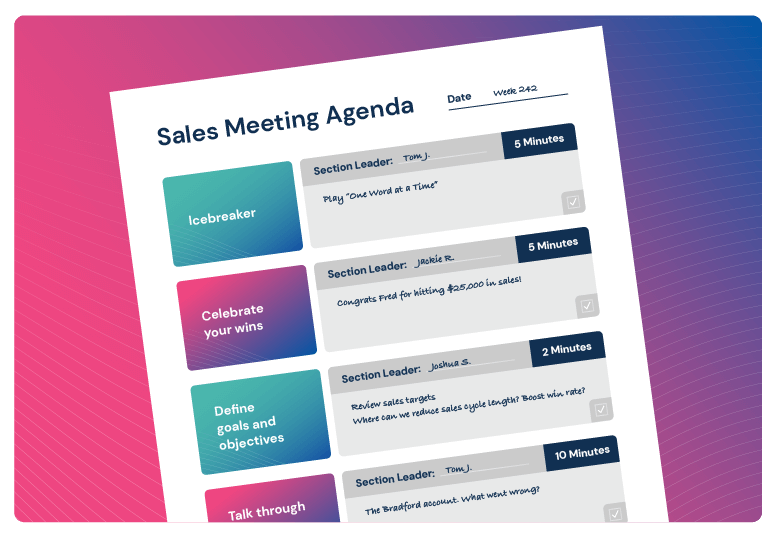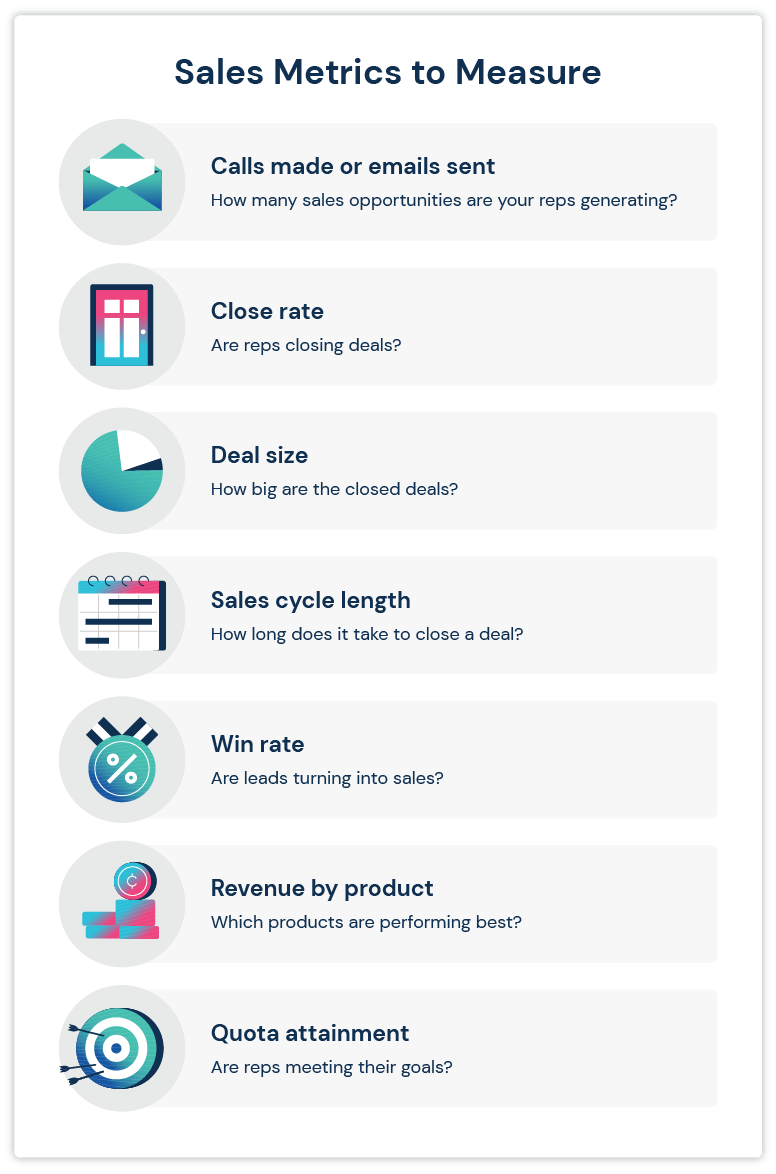Sales Meeting Agenda: 10 Topics To Cover

Contents
Ever think to yourself, “That meeting could have been an email?”
It’s a common sentiment, but it doesn’t have to be your sales team’s reality.
With a comprehensive sales agenda, you can ensure that the sales meetings you run are not just productive, but also engaging and fun.
Having an agenda for sales meetings is important because it sets expectations and helps bring some structure to your sales operations. An agenda can also help your sales operations team understand exactly why the meeting is happening.
Every good sales meeting agenda should include a few key elements:
- A list of topics/issues to be discussed
- Who will lead the discussion for each topic
- How much time should be allocated for each item
- Any relevant materials needed (e.g., sales reports, sales sheets, mock-ups)
- Outcomes or action items that need to be addressed or completed after the meeting has finished
With this in mind, let’s take a look at which topics you should cover in your next sales meeting.
1. Icebreaker
Do you know how much a polar bear weighs? Enough to break the ice!
Icebreakers are a great way to ease your sales team into the meeting. It can help lighten the mood, encourage a more open dialogue between sales representatives, and promote collaboration.
Here are a few things you can do to break the ice in your next sales meeting:
Ask a ridiculous question: asking a silly question can help sales reps loosen up and start thinking outside the box. Has anyone ever asked you what your least favorite possession is?
Play a game: you don’t have to go too crazy here. Ever heard of One Word At A Time? Basically, you build a story with each person in the meeting adding only one word. It’s low pressure, fast, and can yield some pretty fun outcomes.
Share pet pics: it’s quick, it’s cute, and there will be some “awww”s. This can be especially fun if you’re hosting a video meeting with sales reps working from home with their pet pals by their sides.
You don’t have to go all out here. Just do something that’ll help sales reps feel at ease while setting a positive tone for the meeting ahead.
2. Celebrate Your Wins
Did you know that nearly 80% of employees quit their jobs because they feel underappreciated? It’s a pretty heartbreaking stat, especially because it’s an obvious and easy fix.
Taking a little time to celebrate your team’s successes and show them they’re appreciated can go a long way.
Here are a few ways you can help your team celebrate their wins:
- Encourage reps to share a moment or interaction they’re proud of with the team
- Give sales reps a fun reward for their successes
- Acknowledge when reps hit important milestones
- Share positive customer feedback
And don’t forget: it’s a team, so be sure to spread the love!
3. Define Goals and Objectives
Give your reps a TL;DR of the meeting.
Sales reps should feel like the team is working toward something. If reps know what to expect and why they are showing up to sales meetings, they’ll be more likely to stay engaged.
Here are some goals and objectives you can consider covering in your next meeting:
- Review sales targets and expectations
- Discuss strategies on how to better meet sales goals
- Identify sales opportunities and customer needs
- Address sales challenges or questions
- Share knowledge, resources, and best practices
Pro tip: include time limits for each topic to keep the meeting moving.
4. Talk Through Learning Opportunities
Not everything in the sales world is rainbows and butterflies.
Rejection happens. And many people have a hard time dealing with it. In fact, as much as 44% of all salespeople throw in the towel after just one attempt.
We get it. It’s not a great feeling, but it’ll usually provide an opportunity to learn.
Part of being a team is being able to talk through losses together and strategize how to win the next battle.
For example, if a team member stumbled on an important pitch or a sale crumbled at the last minute, use it as an opportunity to ask questions like:
- Why was the sale rejected?
- What can be done differently in future sales pitches?
- How can sales strategies be adapted for different customers or products?
Questions like these provide valuable insight into sales processes and allow teammates to share tips with one another.
Incorporating learning opportunities into your sales agenda can help you anticipate potential issues and create more effective sales methods.
5. Review Sales Performance Metrics
Every sales meeting agenda should include some time to review sales performance metrics.
Taking a quick look at your performance monitoring system in order to track how team members are meeting their targets can help reps identify areas for improvement and ultimately lock down more sales.
Some sales metrics you can plan to review include:

Having sales metrics in place and a system to track performance will provide you with a bird’s-eye view of your sales team’s growth over time.
6. Look at Customer Feedback
This may seem obvious – after all, 93% of customers look at reviews before buying anything – but sales teams often overlook how valuable this feedback can be.
Diving into customer reviews can be rough, to say the least. They’re usually all over the place and may not offer any useful takeaways, but some most definitely will. Here are a few ways to break down feedback with your team:
- Overall trends
- Product issues
- Service issues
- Marketing or sales issues
Product reviews can give sales reps an idea of how well their products are performing, what kind of problems customers are having, and what kinds of features customers want.
Service issues can bring to light any training or growth opportunities for your team.
Marketing or sales issues can show discrepancies between what your sales team promises and what your customer success team experiences.
Using this feedback, sales reps can also get a better understanding of their target audience and tailor their strategies to better meet their needs.
7. Analyze Your Competition
See what’s working for other people. Sometimes a competitor might approach a similar challenge you’re facing in an entirely different way.
It can help shake things up a bit in order to break out of a funk.
Here’s how you can do a quick competitor analysis:
- Take a look at competitors’ websites to see what you’re up against.
- Check out their sales strategies and how they approach sales conversations.
- Analyze their sales materials, such as sales presentations or brochures, to see how they communicate with customers.
- Compare your offerings side by side to see how your products stack up.
You might find that they are better at qualifying their leads or they’re adding extra value to their offerings.
Knowing what the competition is doing can allow you to adjust and tailor your sales approach accordingly.
8. Identify Potential Bottlenecks
Being able to identify and address potential bottlenecks can help your team stay on its toes.
It’s easy to overlook some of the more subtle aspects of sales when you’re focused on the end goal. That’s why it’s important to zoom out every once in a while and pinpoint any bottlenecks that could slow your team’s momentum.
Some common bottlenecks include:
Poor customer identification: targeting the wrong customer segments or failing to identify sales opportunities can be a costly and time-consuming mistake.
Inaccurate sales data: relying on inaccurate sales data is worse than having no data at all, as it’ll send your sales team on a wild goose chase.
Lack of sales training: sales teams need to be equipped with the right tools and techniques to close sales efficiently.
Weak sales messaging: sales messaging needs to be succinct and consistent across channels in order for teams to convert leads into sales.
Inadequate sales materials: sales materials are a sales team’s most valuable weapon. They need to be tailored to the sales process and updated regularly.
Spotting these things early can save your team a lot of time and headaches.
9. Provide Training
For salespeople to be successful, they need to possess the right sales skills and strategies.
Developing a sales training program and incorporating learning opportunities into meetings is essential for sales teams to be successful.
You might not include in-depth training in every single meeting, but providing salespeople with the opportunity to practice and develop their sales techniques every now and then can go a long way.
Whether you’re doing a quick 10-minute refresher or a one-off class, providing your team with the opportunity to polish their skills will not only keep them engaged, but it’ll also make them better salespeople.
Here are a few sales training ideas you might consider ahead of your next meeting:
Do a lunch and learn
Host a lunch where team members can have the opportunity to lead a class on something they’re particularly good at. They can choose a sales topic they want to cover and share some of the techniques that have worked for them.
Organize role-play sessions
Role-playing scenarios can help salespeople become more comfortable with different types of conversations they may have during customer interactions. By practicing how they address customer concerns or objections, they can fine-tune their pitch and take the reins in their next sales call. It’s also a great opportunity to practice selling techniques like rapport-building and active listening.
Bring in a guru
Invite a sales expert to your sales meeting who can offer advice and share their own success stories. It’s a great way for salespeople to get inspired and learn from someone who has already been successful in sales.
10. Action Items and Follow-ups
At the end of every sales meeting, salespeople should know exactly what their next steps should be.
An effective action plan will include specific tasks and deadlines for team members to complete. It’s important that salespeople know exactly what their priorities are and how they can measure their progress. This sales plan will help them stay focused on the objectives and ensure they are hitting their sales goals.
Your plan might include things like:
- Identifying a target audience
- Outlining new sales strategies
- Creating sales materials
- Scheduling sales calls
- Setting up demos with potential customers
Action items should be cut into bite-sized pieces with short turnaround times so reps can focus on the real reason they’re there: selling.
Sales Meeting Agenda Template
While it may be true that some meetings could’ve been an email, sales meetings can provide an invaluable opportunity to learn, grow, and bring your team closer together. And having an agenda on hand can help cut through some of the chaos and keep the meeting moving.
That’s why we’ve put together a template to try out ahead of your next meeting:
By following the tips outlined here, you can rest assured that your team will be looking forward to your meetings instead of dreading them.
Remember, salespeople are only as good as their tools. Schedule a demo today to see how Mailshake can set your team up with all the tools it needs to succeed!





